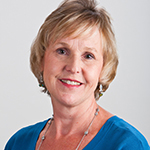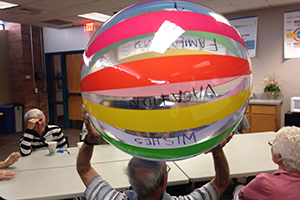By MARY DELACH LEONARD
Dec. 11, 2020
The social isolation and disruption of everyday routines caused by the coronavirus pandemic have been especially devastating for older Americans with dementia — a reality that has received little attention, said Jan Dougherty, a nationally recognized dementia care consultant.

Doughtery
"The negative outcomes are alarming, which is why I'm concerned that there has been so little focus on people living with this chronic serious illness and to their caregivers,'' said Dougherty.
"We know everybody's struggling. But now we have people with memory problems who rely on a family member or care partner who are also very challenged and isolated" because of the pandemic, she said. "We are seeing a greater decline in thinking skills and a change in (patients') overall ability to function as independently as they did prior to the pandemic.''

Before the pandemic forced programming to move online, people living with dementia and their care partners socialized at weekly sessions of Dementia Friendly Tempe's Memory Café.
Photo courtesy of Dementia Friendly Tempe
Dementia is an isolating disease even for people still able to live at home and participate in the community. It is also progressive, and people with later stage dementia are generally cared for in a long-term care setting, Dougherty said. The isolation is magnified for those patients when infection protocols put extreme limits or bans on visits from family and friends.
While visitor restrictions may save lives, separation from loved ones has contributed to cognitive decline among people with dementia because people do better when they see their loved ones, she said. Patients with dementia may not even recognize staff members who are wearing masks and personal protection equipment. This could add to their confusion and suffering.
Dougherty, a registered nurse and dementia expert, previously led family and community-based efforts for the Banner Alzheimer's Institute in Phoenix. She helped Tempe, Arizona, become one of the first dementia friendly cities in the United States when Banner partnered with city officials, health care providers and nonprofits to create Dementia Friendly Tempe in 2016. The initiative helps residents living with dementia remain active and engaged in the community. It provides resources for residents and their caregivers, plus educational programs for the first responders, business owners and religious leaders who interact with them.
In an interview with Catholic Health World, Dougherty discussed ways socialization programs for patients with Alzheimer's are being modified during the pandemic as well as the need for communities to start planning now to accommodate an increasing number of residents who will be coping with dementia in the future.
Like many communities, Tempe has a "memory café" where residents with dementia and their caregivers can socialize with people in like circumstances. How has the pandemic impacted that?
The Tempe memory café shut down in March due to the pandemic, but every Monday the folks who lead the efforts send an email with words of encouragement to participants. It includes a column I write about events and resources available to caregivers, as well as virtual engagement opportunities for the person with dementia. I think it's been useful in keeping our constituents engaged.
The memory café programs are designed to offer programs that engage people with dementia, with separate sessions for caregivers that are very strategy-driven.
As people develop early symptoms of dementia — short-term memory loss and language difficulties — they become embarrassed about going out in public. Many begin to self-isolate. People can develop inertia. It's difficult to get up and go or to initiate activity, although once they're out and about, they usually do well. Many are able to cooperate with the safety protocols of Covid-19, including wearing masks and social-distancing.
If they're married, their spouse might isolate with them, so now there are two people isolated from family and friends.
During this pandemic, caregivers are really struggling with depression and declines in their own health because they are often not keeping medical appointments for themselves. This is where the dementia friendly work comes into play. Those who can reach out virtually are probably getting better support than most.
Are community organizations that provide daycare programs for residents with dementia still able to serve their clients during the shutdowns?
Nonprofits serving older adults, and particularly people with dementia, have tried to innovate and bring online opportunities. But it relies on the family or the caregiver in the home to set up the connection and facilitate the actual engagement opportunity. So, that can be hit or miss. Some daycare programs are reopening but with limited capacity. Many of the participants who previously attended daily are now attending only a few days a week. However, family caregivers and participants are happy even for that opportunity.
We're also seeing organizations finding innovative ways to teach coping strategies for caregivers. For example, a colleague of mine just ran a virtual program on self-compassion.
Dementia Friendly Tempe focuses on educating first responders and business owners about dementia. Why is this so vital?
People tend to think that persons living with dementia are in care homes and assisted living settings — that they have no interaction with the world around them. But people with dementia often live at home for years. They're going to the grocery store. They're going to gas stations. They're going to banks. They're going to call 911. We need these places and employees to better accommodate them.
We also started a program called Dementia Friends based on a program that began in the United Kingdom. It's a grassroots awareness program that explains the signs and symptoms of dementia and how to help someone you suspect might be confused. We ask volunteers to go to their neighborhood, their bible study, book club, scouting group — their circle of influence — and hold a one-hour informational session about what dementia looks like. The sessions are now all virtual.
What should people who are not medical professionals know about dementia?
We've got to remove the stigma from dementia. There are many lingering falsehoods.
For example, people will come to lectures and ask, "When can I expect that my loved one will get aggressive?"
Less than 10 percent of people with dementia will ever get aggressive. Most of the time, aggression is provoked by someone or by an environment that is overwhelming. But because of false information, friends become afraid. They feel like they don't know how to communicate.
People talk about the "friendship divorce" — friends who go away after they learn that someone is living with dementia. We see that with children who think, "Well, this is not my mother anymore.'' We help friends and family members understand what's changing, but also what's not changing, so they can continue to communicate.
A beautiful and important outcome of the memory café are the friendships that form. Before the shutdowns, couples would go to lunch together afterward or gather for a barbecue at somebody's house. And that's important because so many people lose their friends very early.
You just wrote a book called "Travel Well with Dementia: Essential Tips to Enjoy the Journey.'' What tips can you offer for holiday travel?
People with dementia travel all the time, mainly to visit family or friends. Often, it's a disaster because the family and industry haven't been trained to support them.
During this holiday season, it is even more important to plan ahead. Communicate your needs to family members and friends and determine if it is truly safe to travel to a destination or invite family and friends into your home. That could increase the risk of getting Covid-19. When out and about in your community, observe all of the precautions and help your loved one do the same.
The aging of baby boomers will swell significantly the number of people with dementia. How will that increased demand for dementia care be met?
It is a new era, and we've got to get it together in the next 10 years. I think we're going to see a lot more community-based programs and strategies because of the cost of care.
And I have concerns about our shrinking workforce. The expense to our kids is going to be immense, and we need to figure that out now.
Copyright © 2020 by the Catholic Health Association
of the United States
For reprint permission, contact Betty Crosby or call (314) 253-3490.